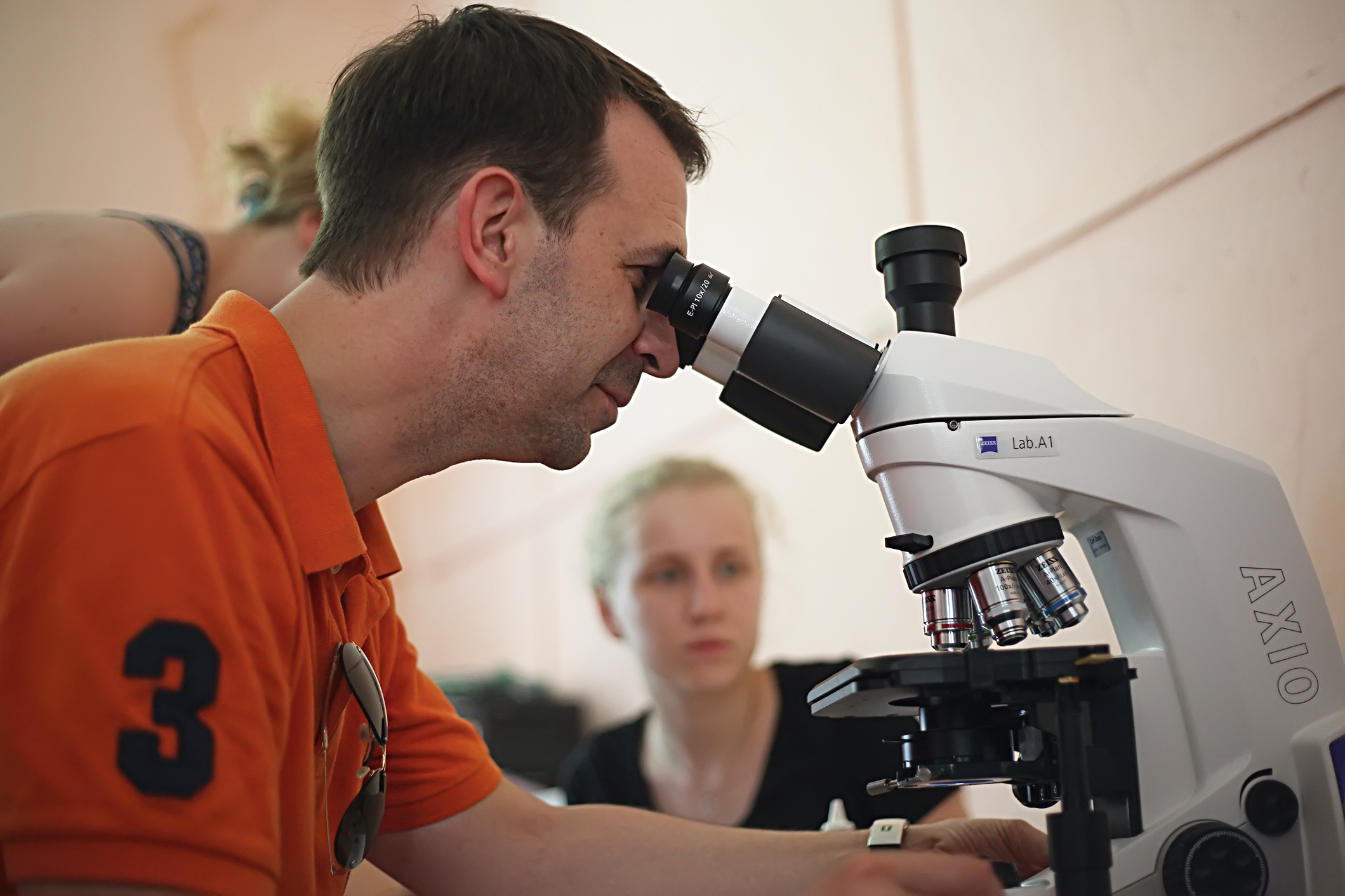Education and Science Deputy Minister visited the Summer School
Education, 12 August 2017
Education and Science Deputy Minister Grigory Trubnikov visited the third stage of the Summer School. At the press conference, he told school participants about plans for changing post-graduate programme, support of natural sciences and shared his impressions of the “Beautiful Science” project.
 Grigory Trubnikov is looking at thin slices of earth materials (thin sections), the “Beautiful science” programme’s partcipants work within the framework of the Summer School © Journal “Schroedinger’s cat”
Grigory Trubnikov is looking at thin slices of earth materials (thin sections), the “Beautiful science” programme’s partcipants work within the framework of the Summer School © Journal “Schroedinger’s cat”
A meeting with Grigory Trubnikov was held on 29 July 2017. The canteen housed participants of various School workshops of the third stage. Direct and vital questions were adressed to Grigory Trubnikov. His answers were the same.
Glory to Bachelors of natural sciences!
Natural sciences are to get additional state support. However, their budget will increase gradually. According to Trubnikov, such a decision is presupposed by the fact that science basis and dynamics of its development should correspond to the economic situation. Moreover, Deputy Minister noted that at the present stage of science reforming, sharp increase of state funding will be “waste of budget” as far as most of research institutes and higher education universities are not effective. Their reorganization and establishing of colleges at their bases will take some time.
Grigory Trubnikov is one of the authors of the strategy for scientific and technological development in Russia until 2035. In the frames of the strategy, there are seven directions of the highest priority. Two of them, agricultural industry and medicine, are directly connected with biotechnologies, and the Ministry is to pay special attention to them.
It’s honourable to be Candidate
Grigory Trubnikov outlined plans for upgrade of postgraduate education in the fields of natural sciences. Postgraduate students of research specializations will have an opportunity to continue their education after the defense of their thesis. Students of other specializations will have an opportunity to defend the qualifying work and get the Degree equal to PhD. According to Trubnikov, postgraduates conducting scientific work need more time for writing a candidate’s thesis. After the defense, 2 – 3 years are planned to be added to education for scientists to continue their research. “If you want to be a researcher, then post graduate education may take 3+2 or 3+3 years. One has got three more years, and it will touch upon all social issues: scholarship, army – but a student has to defend a dissertation,” Grigory Trubnikov believes. Furthermore, Deputy Minister noted that demand of teaching activity and design of curriculum might be abolished. Some specialists, like lawyers and teachers, will have an opportunity to defend thesis three years later. As Grigory Vladimirovich told the press-conference participants, it is considered in his research institute, in particular, that writing a dissertation takes 10 years. Trubnikov himself studied for postgraduate education for about 8 years.
Both mosaic and science
Before the press conference, Grigory Trubnikov had time to visit only one School workshop – the “Beautiful science” programme of the School of Science and Journalism. Deputy Minister got acquainted with possibilities of microphotography of geological features – thin sections. “I was deeply impressed by the thin section in the polarized light. It looks just like the Vrubel mosaic on the fronton of the Metropol Hotel. It is absolutely alluring,” Trubnikov said.
In the framework of the “Art in the microscope” project, participants compare thin sections in multiple zooming with paintings by world-famous artists. Moreover, other numerous ideas are implemented here: they slice off fruit, compare how different types of cheese available at shops look like under the microscope. They manage to see something unusual in ordinary things.
Source: Summer School web-site
Interview with Grigory Trubnikov to the “Schroedinger’s cat” journal